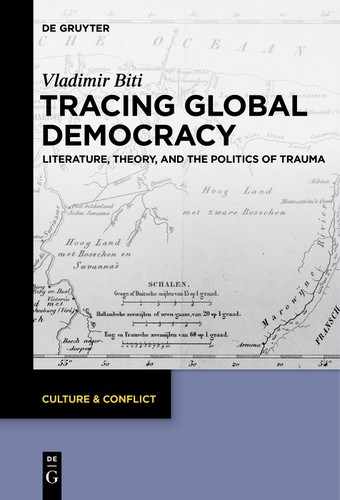Acknowledgments
While working on this book I have published portions of it in different forms. To adapt them to the final shape of argument, I have revised all of them with one exception.
Chapter 1 is a modified version of the essay “The Divided Legacy of the Republic of Letters: Emancipation and Trauma,” Journal of Literature and Trauma Studies (University of Nebraska Press) 2: 1 (2012), 1–30.
Chapter 2 is a modified version of the essay “The Fissured Identity of Literature. The Birth of National Literary History out of International Cultural Transfers,” Journal of Literary Theory (De Gruyter) 1–2: 7 (2013), 1–30.
Chapter 3 is an extended and revised version of the essay “Two Concepts of Literary Bildung: Education and/or Self-Formation?” in Vladimir Biti, ed., Reexamining the National Philological Legacy: Quest for a New Paradigm? Amsterdam and New York: Rodopi, 2013, 23–42.
Chapter 4 draws on portions from “The Divided Legacy of the Enlightenment: Herder’s Cosmopolitanism as Suppressed Eurocentrism,” in Marc Maufort & Caroline de Wagter, eds., OldMarginsandNew Centers: TheEuropean Literary Heritage in the Age of Globalization, Bruxelles et al.: Peter Lang, 2011, 73–83.
Chapter 5 is an original contribution.
The argument taken in Part Two is sketched in the German-language essay “Theorie und Weltbürgerlichkeit,” in Mario Grizelj and Oliver Jahraus, eds., Theorietheorie: Gegen die neuerliche Theoriemüdigkeit in den Geistes- und Kulturwissenschaften, Paderborn and Munich: Wilhelm Fink, 2011, 291–303.
Chapter 6 is an extended and revised version of the essay “The Adulterous Theory,” Neohelicon (Springer) 1: 40 (2013), 11–21. This essay was published in slightly modified version, in German, under the title “Die verinnerlichte Außerhalbbefindlichkeit: Über die weltbürgerliche Legitimierung der theoretischen Wahrheit,” in Mario Grizelj, Oliver Jahraus and Tanja Prokic, eds., Vor der Theorie: Immersion – Materialität – Intensität, Würzburg: Könighausen & Neumann, 2014, 163–183.
Chapter 7 is an extended and revised English version of the German-language essay “Anschlussfähigkeit und postkoloniale Welt: Zum Stellenwert des Romans in Luhmanns Systemtheorie,” in Grizelj, Mario and Daniela Kirschstein, eds., Riskante Kontakte: Postkoloniale Theorien und Systemtheorie? Berlin: Kadmos, 2014, 251–278.
Chapter 8 is an original contribution.
Chapter 9 substantially extends and reworks portions taken from the essay “The Self, the Novel and History: On the Limits of Bakhtin’s Historical Poetics,” Orbis Litterarum (Blackwell&Viley) 4: 66 (2011), 255–279.
Chapter 10 substantially extends and reworks portions taken from the essay “Distance and Proximity,” Neohelicon (Springer) 2: 37 (2010), 469–475.
Chapter 11 substantially extends and reworks portions taken from three essays: “From Literature to Culture – and Back?,” Primerjalna književnost 1: 31 (2008), 15–25, “Narrative Identification,” Arcadia (De Gruyter) 1: 43 (2008) and “Toward a Literary Community?” in Theo D'haen und Iannis Goerlandt, eds., Literature for Europe, Amsterdam, New York et al.: Rodopi, 2009, 27–42.
Chapter 12 draws on the short draft of “Literature as Deterritorialization: Gilles Deleuze and Jacques Rancière,” in Sonja Stojmenska-Elzeser and Vladimir Martinovski, eds., Literary Dislocations, Skopje: Institute of Macedonian Literature, 2013, 19–27. It was published in the given form under the title “Disaggregating Territories: Literature, Emancipation, and Resistance,” in Umjetnost rijeci/The Art of Words: Journal for Literature, Theatre and Film Studies 3–4: 58 (2014).
The epilogue was written especially for this book.
I offer my thanks to the publishers for their permission to use revised versions of these essays here.
